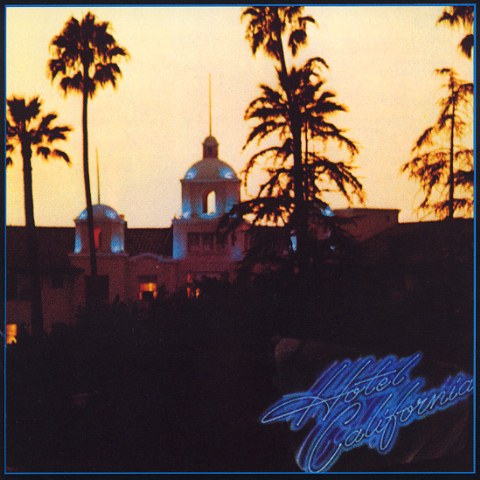
Hotel California (1976)

1. Hotel California
2. New Kid in Town
3. Life in the Fast Lane
4. Wasted Time
5. Wasted Time (Reprise)
6. Victim of Love
7. Pretty Maids All in a Row
8. Try and Love Again
9. The Last Resort
By the time Hotel California appeared in late 1976, the Eagles were no longer the country-rock hopefuls of a few short years before. They were an institution. And, somewhat paradoxically, this — their fifth studio album — marked the moment they stopped documenting a dream and started dissecting it.
Gone were the sunlit open roads and twangy ease of their early catalogue. The West, as myth and motif, had collapsed under the weight of success, and in its place came something darker, slicker, and unmistakably urban. Hotel California is often misread as a concept album — it isn’t, strictly — but its thematic coherence and narrative flow are unmistakable. It is a meditation on excess, entropy, and disillusionment, dressed in flawless harmony and guitar sheen.
The lineup had shifted again. Bernie Leadon, the group’s country conscience and occasional banjoist, had exited — reportedly voluntarily, though whispers suggest otherwise. His replacement was Joe Walsh, a longtime friend of the band with a solo career, a rock pedigree, and a guitar tone capable of blowing the barn doors off anything in sight. Together with Don Felder, Walsh formed a two-headed, Les Paul-wielding beast, and their twin-guitar leads brought the Eagles something they had never quite possessed before: danger.
The title track, composed around Felder’s haunting chord progression, sets the tone with eerie precision. It opens the album with the ominous grace of a gothic Western, its lyrics a fever dream of seduction, stasis, and moral corrosion. Henley’s vocal — weary, measured, immaculate — wraps the whole thing in a narrative so vivid it verges on allegory. Few songs so perfectly capture the cultural unease of the late ‘70s. Fewer still become folklore.
If Hotel California alone were the centerpiece, the album would still merit its pedestal. But the strength of the surrounding material renders that hypothetical unnecessary. Life in the Fast Lane, driven by Walsh’s jagged, muscular riff, is a full-bodied sprint into hedonism, lyrically complementary to the title track’s descent. The Last Resort — often overlooked, but beloved by devotees — closes the album with an elegiac critique of westward expansion and spiritual rot, Henley’s voice steeped in controlled fury. It may be the band’s most ambitious piece.
Even the softer moments resist sentimentality. Wasted Time, a ballad of crystalline sadness, is bolstered by a lush orchestral reprise that opens side two — a rare indulgence, executed with restraint. Walsh contributes the oddly tender Pretty Maids All in a Row, a song whose lyrical opacity is balanced by its melodic sincerity. Meisner’s Try and Love Again is his swan song, both literally and figuratively; his tenure with the band would end soon after, and here his voice sounds distant, even fragile.
New Kid in Town, with Frey at the mic, recalls earlier Eagles efforts — breezy, melodic, vocally rich — but now shadowed by the sense that the world it once described has changed irrevocably. Even Victim of Love, the album’s least celebrated track, drives home the new aesthetic: rock over country, bite over twang.
Behind the scenes, the band was fraying. The precision of the album belies the pressure cooker it was recorded in. Interpersonal tensions had begun to calcify; success had become its own kind of trap. The irony, of course, is that Hotel California would be the peak they could never quite match again. It sold by the millions, earned Grammys, and cemented their place in the pantheon — and yet, it also marked the beginning of the end.
But to judge Hotel California merely as a symptom of collapse is to miss the point. This was — and remains — a flawless distillation of a very specific cultural moment. It isn’t just The Eagles’ finest hour. It’s one of rock’s finest hours. Period.
Go back to the main page
Go To Next Review